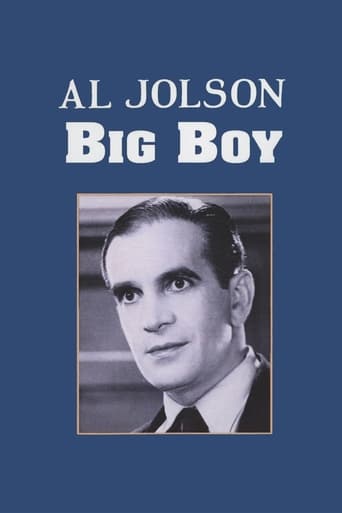

I like the storyline of this show,it attract me so much
... View MoreIt's entirely possible that sending the audience out feeling lousy was intentional
... View MoreI really wanted to like this movie. I feel terribly cynical trashing it, and that's why I'm giving it a middling 5. Actually, I'm giving it a 5 because there were some superb performances.
... View MoreStrong acting helps the film overcome an uncertain premise and create characters that hold our attention absolutely.
... View MoreDirector: ALAN CROSLAND. Screenplay: William K. Wells, Rex Taylor, Perry N. Vekroff. Based on the 1925 Broadway musical by Harold Atteridge. Photography: Hal Mohr. Film editor: Ralph Dawson. Art director: John Hughes. Costumes designed by Earl Luick. Songs (all Jolson): Hooray for Baby and Me, Tomorrow Is Another Day, Liza Lee, Down South, What Will I Do Without You?Copyright 5 August 1930 by Warner Brothers Pictures. New York opening at the Winter Garden: 12 September 1930. 6,275 feet. 69 minutes. (Available on a very good 9/10 Warner Archive DVD).COMMENT: In my opinion, one of Jolson's best films. I'd rate this one third, after Rose of Washington Square and Wonder Bar. Based on Jolson's huge Broadway success, the movie is crammed full of delightful inside jokes and throwaway lines - some of which have to be heard to be believed! Jolson has such a great time singing and ad-libbing that he passes this enthusiasm on to the audience. Crosland has wisely filmed the proceedings as if it all took place on a theater stage. This adds to the fun. Unfortunately, some of the other early Jolsons now available don't stand up at all well. And even a later one, The Singing Fool (1936), finds Jolson swamped by the futile attempts of knockabout comedians (Mitchell and Durant) and over-talkative camera-hoggers. But "Big Boy" is a joy!
... View MoreBig Boy was a complete shock to me, a 1930 picture that was vibrant, funny,bizarre and very entertaining. I bought it expecting to see a train-wreck,a politically-incorrect minstrel show featuring a white actor performing in black-face. Not just for a scene or two mind you, but for the entire picture(save for the very end)!!! What I got was a fabulous performance by Al Jolson,who is frankly so good here it's almost scary. He's funny, charming, sings wonderfully and performs with a sort of wink-wink to the audience, as if he knows he's in a ridiculous situation as an actor and wants everyone else to know it. His asides are often hilarious,and frankly he is so good overall that if he had chosen to play the part in normal black makeup, without the exaggerated lips common with black-face, I honestly think he would've disappeared into his role completely and truly transcended his makeup. The plot is almost completely beside the point-it exists simply to provide a frame-work for a series of wonderful musical interludes.There is one extended flashback sequence that appears almost out of nowhere, and is so wild and broadly played that I don't think anyone who sees it will ever quite forget it. Print quality is sometimes excellent, and often-times poor. This picture is in definite need of some restoration. I have to applaud those who decided in this sensitive age to release a movie as bizarre and potentially offensive as this one,and I'd like to think that it's because they trust us to be adults and apply some context to what we're watching. If the very idea of black-face portrayals offend you, this picture is to be avoided at all costs. If you can place the use of it into a proper context, this picture might still offend you, but at least you won't keep yourself from watching a wonderfully bizarre and surreal little curio. The ending to my mind is fabulous,by the way.
... View MoreI was fortunate enough to see this film on the big screen (as all great film stars should be seen) almost 20 years ago and it was one of the most thrilling film experiences I have ever had.Despite the film being politically incorrect in this day & age it is a great testament to all the performers who appeared in the beginnings of the sound revolution.Al Jolson appeared as Gus the main character (& the role he actually played on broadway many times in different productions)in this play that was literally filmed on the stage.If anyone with an open mind sits through a showing of the film, I'm sure that they would appreciate the 'rough' basic performances and the contribution they made to film history.
... View MoreThis movie is most notable as the film where Al Jolson plays the lead role in black face, which - in case you don't know - was the way any black lead role was because black people weren't allowed to have starring roles in Hollywood. Of course, if you can beyond the disgusting display of a white actor playing an over-the-top black stereotype...well, it's a pretty bad movie anyway.
... View More